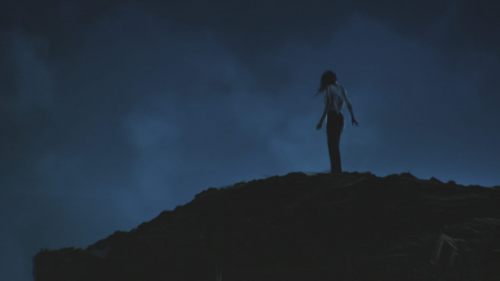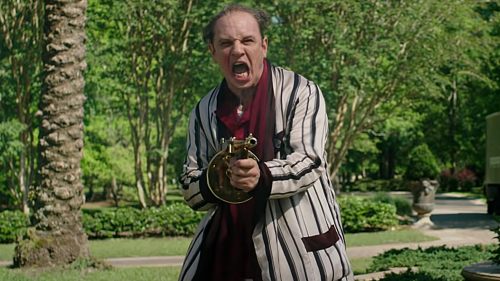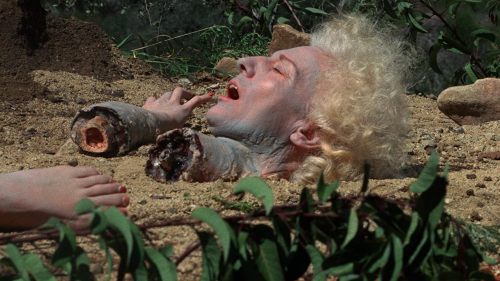ONCE UPON A TIME IN HOLLYWOOD Review: Tarantino Leaves Tinseltown Burning In His Wake
Quentin Tarantino has stated on multiple occasions that he’ll throw in the towel on this whole filmmaking racket after he completes his tenth feature. Where he goes from here is anyone’s guess, however; ‘here’ being Once Upon a Time in Hollywood, his ninth film and a glorious kiss-off to a rapidly changing (or, he fears, evolving) entertainment economy that may soon have no use for provocateurs nor celluloid purists. This is the clear handiwork of an auteur aware that he’s in his career’s later phase, with an elegiac streak looking back in lamentation and fury. He leaves only scorched earth and the smell of propane behind him.
It’s 1969, and Los Angeles — the area itself as well as its synonymous industry of showbiz — has gotten a nearly complete facelift. The hippies have flooded the city and brought their sideburns, fringe, tie-dye, crocheted halter tops and LSD-dipped cigarettes with them. Cowboy-and-Indian pictures fall a little further out of favor with every passing year. Tall men with commanding chins like Rick Dalton (Leonardo DiCaprio) find themselves outside of the zeitgeist looking in, and when you make a living by being known and desired, that’s tantamount to death.
The salad days of Dalton and his stunt double Cliff Booth (Brad Pitt) took place in the ‘50s, when they jointly starred on the gunslinger serial Bounty Law, but Dalton fouled that up by pursuing movie stardom and failing. They find themselves relegated to guest spots on other people’s shows, and confused about what the hell happened to America. Dalton’s investment in that particular question might be the thing keeping him from going to Italy, where a second act in spaghetti Westerns waits for the taking. The inkling that bigger money may lie overseas, but that accepting it would represent some concession of defeat on the home front he once ruled, is not difficult to project onto Tarantino.
Also in the mix: Dalton’s neighbors Sharon Tate (Margot Robbie, not nearly as present as we’ve been led to believe) and Roman Polanski, a precocious eight-year-old girl steeped in the Method technique of acting, a hot-tempered Bruce Lee, a pit bull named Brandy, and an encampment of unsettling flower children who keep bringing up this “Charlie” guy. In no small part, the setting provides Tarantino with an excuse to immerse himself in the Hollywood of his dreams, a meticulously reconstructed fantasyland of neon marquees and grainy filmstrip textures. When a haughty agent (Al Pacino) mentions that he just watched some of Dalton’s work the night before, he specifies that it was on thirty-five millimeter.
Tarantino ruffled some feathers with his request to keep the ending under wraps, though warning of a big twist in a historical drama (combined with his known predilection for revisionism) might as well be its own spoiler. Suffice it to say that those starved for stylized violence will get their bone and like it. The rest of us, those more preoccupied with the arc of an American artist, have something tougher to chew on. The film ends in the only way it could possibly end: with time marching onward, leaving some of us behind. While Tarantino insists he’s got one more in him, there’s a part of me that believes he’d die before he’d willingly put down his camera, and the parties emerging victorious in the delirious grand finale support this much. If he’s getting ready to pack it in, though, this is how you do it. Indulge every nostalgist whim, stare at the feet, get everything you can while you can. They say you’re only as good as your next movie. For Tarantino and Dalton, having a next movie at all constitutes a victory.



